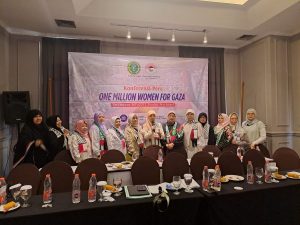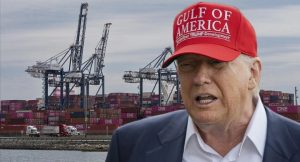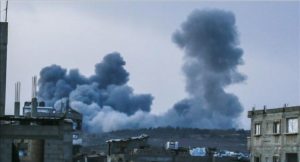 “Towards an Understanding of US Foreign Policy in the Middle East: Obama’s Five Core Tenets of U.S. Foreign Policy.” (Part 2 of 3)
“Towards an Understanding of US Foreign Policy in the Middle East: Obama’s Five Core Tenets of U.S. Foreign Policy.” (Part 2 of 3)
by Barry Grossman*
US President Barack Obama used his 24 September 2013 speech before the United Nations General Assembly to spell out the five core tenets of U.S. foreign policy in the Middle East and North Africa. While professing some resistance to the long standing US tactic of using unilateral military action to achieve its aims, he echoed the core tenets of the long standing US position by saying: “So let me take this opportunity to outline what has been U.S. policy towards the Middle East and North Africa, and what will be my policy during the remainder of my presidency.”
Also Read: Nuclear Technology: Harm and Benefit from the Qur’anic Perspective
1.”The United States of America is prepared to use all elements of our power, including military force, to secure our core interests in the region.”
2. “We will confront external aggression against our allies and partners, as we did in the Gulf War.”
3. “We will ensure the free flow of energy from the region to the world. Although America is steadily reducing our own dependence on imported oil, the world still depends upon the region’s energy supply, and a severe disruption could destabilize the entire global economy.”
4. “We will dismantle terrorist networks that threaten our people. Wherever possible, we will build the capacity of our partners, respect the sovereignty of nations, and work to address the root causes of terror. But when it’s necessary to defend the United States against terrorist attacks, we will take direct action.”
Also Read: Gaza Cries Out, the World Stays Silent: A Wounded Humanity
5. “And finally, we will not tolerate the development or use of weapons of mass destruction. Just as we consider the use of chemical weapons in Syria to be a threat to our own national security, we reject the development of nuclear weapons that could trigger a nuclear arms race in the region, and undermine the global non-proliferation regime.”
“Now, to say these are America’s core interests is not to say these are our only interests. We deeply believe it is in our interest to see a Middle East and North Africa that is peaceful and prosperous; and will continue to promote democracy, human rights, and open markets, because we believe these practices achieve peace and prosperity.” “But I also believe that we can rarely achieve these objectives through unilateral American action – particularly with military action. Iraq shows us that democracy cannot be imposed by force. Rather, these objectives are best achieved when we partner with the international community, and with the countries and people of the region
American Exceptionalism and Unilateralism:
The 1st and 2nd tenets stated by Obama hardly need to be explained. These propositions are yet another “throwing down of the gauntlet” to those nations which oppose US hegemony and are an open ended threat which echoes George Bush’s famous declaration to all people and nations that they are “either with us – either you love freedom and with nations that embrace freedom – or you’re with the enemy; there’s no in between!”
Also Read: Indo Defence Expo and Forum; Sharing Responsibility of Humankind and Environment
Obama states that the US will not hesitate to “use all elements of [US] power, including military force, to secure our core interests in the region.” While he says almost nothing concrete about what those “core interests” are, it is clear from the relatively perfunctory weight given in his UN address to human rights, democracy and the rule-of-law, on one hand, and his heavy emphasis on economic stability, securing US allies against “external aggression” and what, without even a of irony, he refers to as securing “the free flow of energy,” that there is little apart from tactics to distinguish Obama’s view of US core interests from that articulated by the US Neocon establishment before and during the “reign” of George W. Bush.
Obama’s disingenuous statement that the US “… will confront external aggression against our allies and partners, as we did in the Gulf War,” leaves no doubt that the US has a very creative and flexible notion of what constitutes “external aggression” and little discernment in choosing its allies. To many victims and observers, the US policy of pre-emptive war which reached its apogee with the Bush doctrine has turned the Nuremburg laws upside down. (From the 1946 Nuremberg Tribunal Judgement: “To initiate a war of aggression is not only an international crime; it is the supreme international crime differing only from other war crimes in that it contains within itself the accumulated evil of the whole”.)
Bush Doctrine
If we deconstruct the phrasing used by Obama in expressing his 2nd tenet in light of the historical record, clearly he has not in any way rejected the Bush Doctrine. While he purports to put the Bush Doctrine of pre-emptive war on the “back burner,” Obama expressly reaffirms its basic premise. He has only shifted the emphasis. Apart from that, what his 2nd tenet really says is that as a corollary to his 1st tenet, the US considers itself free to use as much or as little of its overwhelming political, economic and military power:
Also Read: Safiya Saeed: From Somali Migrant to First Hijab-Wearing Mayor of Sheffield
1.To prop up and secure the political apparatus in any nation which is compliant with the US led NWO; and
2.To bring about regime change in any nation that is not.
Implicit in the wider US position is that all other nations must “do as we say not as we do.”
Clinton Doctrine
Also Read: Why Food Safety is Essential During Hajj Services?
Pragmatically speaking, Obama’s position places his administration somewhere between the militarist “Bush Doctrine” and the insipid “Clinton Doctrine.” The Clinton Doctrine, it should be noted, was never expressed as a doctrine which sets limits on US military intervention but rather as one which provides a humanitarian justification for intervention when there is no obvious US security interest at stake in the sense that National Security was loosely defined before 9-11.
What the foreign policy position of all recent Presidents – Reagan, Carter, Bush Senior, Clinton, Bush Junior and Obama – have in common, is that however they chose to express their foreign policy positions, the tenets formulated by each successive President have built on those articulated by their predecessors and always purported to establish a footing – be it moral or pragmatic – for unilateral US intervention in the affairs of other sovereign states. What we should learn from this is that the only practical prospect for change in US foreign policy exists at the margins and, even then, any change is quickly subverted by America’s dominant Militarist and Corporatist tendencies.
With all the US initiated, pre-emptive warfare since the 1991 Gulf War, it is certainly more than a little odd that Obama had to reach back 25 years to cite George H. Bush’s Gulf War as an historical example of Obama second tenet in action!
When we understand that it is governments rather than nations which the US sees as allies or partners, it immediately becomes apparent that in warning off “external aggression,” Obama is referring not only to aggression by other States against those allied with the US but also any threat or undesirable influence, be it internal or external, which is perceived as undermining governments/regimes which are compliant with its US centric world view and all that entails.
Also Read: Indonesia Sign Language Mushaf Qur’an; A Sustainable Gift in Celebrating Pancasila Birthday
Of course the apparatus of US government is not entirely discriminatory against foreign nations and its foreign policy is clearly mirrored in its domestic policy. In this regard, insofar as the prevailing view of its “Living Tree” Constitution permits, the US establishment certainly takes a similar approach to agitators, dissidents, people of conscience and anyone in America who is perceived as a threat to the political status quo or its dominant ideology of unrestrained Corporatism. That 12 political appointees who comprise the US Supreme Court seem in recent years to have tacitly reconceived the Constitution from living as a very slow growing oak tree to something more akin to a fast growing plantation pine tree certainly has not served those people who do not fully submit to the establishment’s corporatist view of the universe.
Obama vs Neocons
The main difference between Obama and the Neocons who held sway over the Bush administration is that whereas Obama at least professes to be more circumspect about using unrestrained military force as distinct from various other coercive means to impose US will, the Neocons were unabashed in their preference for immediately pressing home the US advantage by waging “simultaneous wars on multiple fronts” with a view to imposing US styled corporatism on its vanquished nations. The “change” in emphasis introduced by Obama is significant but ultimately at best only temporary and marginal. In other words, it is tactical rather that strategic. That said, we should not to diminish the significance of Obama’s apparent unwillingness to lead the US into more full scale Bush style wars as plotted by the Texan’s Neocon handlers; but we also should be so foolish as to believe that the Neocons have gone away.
We should of course take the administration to task for the shocking loss of civilian life caused by security apparatus’s Orwellian drone warfare program. But we should not lose sight of the fact that the Obama administration would probably never have been able to stop the program even if Obama had the political will to try. Without wanting to place his efforts too highly, at least Obama has endeavoured to take some of the horror out of the program by imposing still loose but somewhat stricter guidelines and transferring operational control of much of America’s armed drone fleet from the CIA to the State Department. In a nutshell, he has given us more welcome marginal change “we can believe in” but the substance of which falls far short of what is required.
Also Read: Leila Khaled, The Icon of Palestinian Women’s Resistance
We must, of course, lament the staggering loss of life and disruption caused by the US security/policy apparatus even when it is merely simmering in places like Libya and Syria. But we also should not minimize the Obama’s claimed preference for dealing with any international resistance to US imperatives by what he loosely describes as a political process rather than the blatant full scale militarism that marked out the Bush administration.
In terms of principle, the difference is marginal; but with the world living for now in that murky margin facilitated by Obama, we have been spared another million or so victims of brutal, one sided “shock & Awe” style warfare conceived, not to win an existing conflict but rather to create a conflict conceived to permanently dismantle the social, political and economic infrastructure of a nation and replace it with one built in America’s own image. That said, it is entirely conceivable that the creeping change now being introduced more by stealth than by open warfare, will in the long run impose a far higher toll on humanity than Bush style invasions but without the inconvenient headlines which have a tendency to rock the US establishments already shaky foundation.
The sad reality is that the kind of marginal change introduced by Obama already places his administration at the extreme end of the kind of change which, practically speaking, is possible in a political and economic environment which has ratcheted standing “super armies,” aggressive militarism and corporate profiteering into the dominant paradigm.
All that said, even with due acknowledgement of Obama’s modest accomplishments in winding back the tightly wound spring of US militarism, the 1st and 2nd Obama tenets stand as a naked reaffirmation of US exceptionalism and an assertion that the US does not consider itself bound by international convention or law except as it chooses to be.
Also Read: The Twilight of the Zionist Israeli State
President George W. Bush expressed the same basic position of US exceptionalism when he set about preparing the policy establishment’s shaky foundation – the will of its apathetic people – for a belligerent, unprovoked war on Iraq. At the time he said:
“The course of this nation does not depend on the decisions of others.”. . . “We really don’t need the United Nation’s approval to act. When it comes to our security, we do not need anyone’s permission.”
Neoconned Bush vs Clinton Doctrine
Of course he neglected then or at any time since to explain just what the belligerent and devastating assault on Iraq had to do with US national security and when the pretence of National Security became transparently absurd, the Neoconned Bush administration quickly segued into a caricature of the “Clinton Doctrine” to justify on quasi-humanitarian grounds its belligerent military assault that was a war in name only. The preceding invasion of Afghanistan already planned and underway even before the Twin Towers fell also does not withstand informed and objective scrutiny. How can we forget Bush’s carefully scripted on 20 September 2001 speech attended by all the usual suspects from both sides of US politics and replete with ironies entirely lost on all of them? How we overlook Bush’s 29 January 2002 contrived “axis of terror” speech to a compliant Congress? How can we forget the ironic lies trotted out in his 17 March 2003 ultimatum to former US ally Saddam Hussein?
Also Read: Prof. Abdul Fatah El-Awaisi and the Intellectual Roadmap for the Liberation of Al-Quds
Obama, being somewhat more diplomatic and well spoken than Bush, concedes some role to the United Nations but limits its function to dealing with clear military aggression by other states, while appropriating for the US the exclusive right to unilaterally deal with any other resistance and, if deemed necessary, to unilaterally override the UN’s primary role in military conflicts.
Exceptionalism and unilateralism are, of course, only means to an end or, if you prefer, tactics. To fully understand the implications of the US position we must ask ourselves, to what ends does the US consider itself exceptionally entitled to violate the sovereignty and peoples of other nations? The obvious answer is “to whatever ends the US military industrial complex and political apparatus decide.” Yet that alone does not quite state the true horror of it since it leaves room for the commonly held view that the US is somehow guided by an enlightened concern for justice, human rights and the larger human condition.
As articulated by the Neocon “Project for a New American Century” in its polemic “Rebuilding America’s Defences,” faced with being marginalized in a world that will increasingly be dominated by Asia, there is something close to a consensus in Washington’s corridors of power that the US must capitalize on its status as the only remaining true super power by building a US hegemony throughout the world using its military might. What is the ideology of this hegemony they aspire to? In a word, Corporatism! Obama’s apparent point of departure from the Neocon playbook is that he at least claims to have used his presidency to ensure, whenever possible, that the agenda is advanced by means other than full military conflict with all that entails. In that regard, he does indeed reflect the will of America’s “war weary” people.
That is not to say that a majority American’s are opposed to Washington’s wars on moral grounds. They are simply tired of paying for them and not sophisticated enough to understand that it makes little difference to their tax burden whether the massive US security apparatus budged is dispersed in clandestine “black ops,” regional skirmishes and maintaining what is overwhelmingly the largest standing army the world has ever seen, or dispersed in paying for what are conceded openly to be “wars.” That Obama used his UN address, to announce that the US military is “shifting away from a perpetual war footing” seems to be something akin to sophistry.
Also Read: Dr. Joserizal Jurnalis: Founder of MER-C and Indonesia’s Humanitarian Icon on the Global Stage
So what do those who occupy the corridors of power in Washington mean by a US hegemony or, as the Neocons described it, a “Pax American”? In effect, they mean establishing a New World Order dominated by US corporate interests and governed by the US conception of what is a proper legal, economic and social normative framework for all nations. (T/BG/E01)
Mi’raj Islamic News Agency (MINA)
*Barry Grossman received his B.Comm. from the University of Calgary in 1984 and an LLB from York University’s Osgoode Hall Law School in 1987. After working as a litigator at a major commercial law firm in Toronto, he was recruited to teach at the University of Melbourne’s Faculty of Law in Australia. He later worked for several years as a commercial litigation consultant to the national firm of Freehill, Hollingdale & Page before later taking up a full time lectureship at Monash University’s Faculty of Law. Mr. Grossman has written extensively on various legal subjects and is a frequent commentator on political affairs. He is often interviewed by Press TV and Sahar TV.He has resided in Indonesia since 1999 and spent long periods of time in several countries, including Germany, Canada, the United States, Mexico, Australia and Thailand. Mr. Grossman is a Muslim.
This article was written for the Indonesian based international news service, Mi’raj Islamic News Agency (MINA) as requested by MINA Deputy Editor-in-Chief, Syarif Hidayat. The views expressed in this article are the author’s and do not necessarily reflect those of MINA.




























 Mina Indonesia
Mina Indonesia Mina Arabic
Mina Arabic